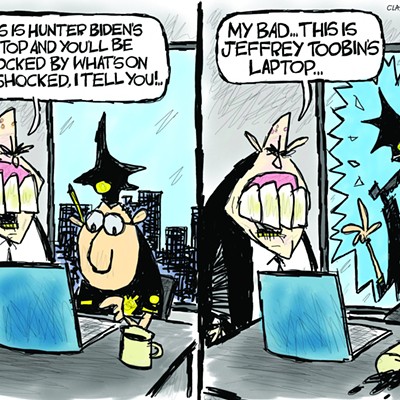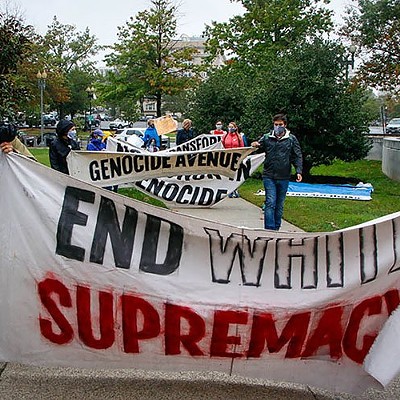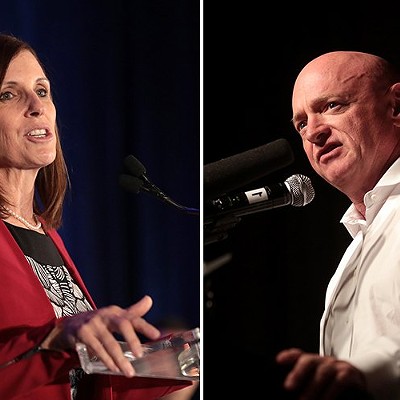So let me ask you: Did you find your life improved by the nonstop festival of Sept. 11 consciousness we were all treated to 10 days ago? Wasn't it great, getting to travel back in time to those days and weeks when we were all freaked out all the time? Didn't you appreciate reliving the shock and horror?
Like we'd forgotten. Like we needed a bunch of pious talking heads to tell us how to feel about it.
The media saturation was nearly complete: It was all Sept. 11, all the time, for days.
I was reminded, weirdly enough, of the scene in Sleepless in Seattle where Meg Ryan is driving by herself at Christmastime, and the only thing on the car radio is "Jingle Bells," by every possible artist and in every possible arrangement. Desperate, she switches stations and the DJ says, "And now, 'Jingle Bells'--backwards!"
I was also reminded of the "Remember Pearl Harbor" pin Nana used to keep in her jewelry box. (I couldn't remember it, of course, which made me feel guilty.) The Bush administration's program of never for a minute letting us forget we were attacked is modeled on the Roosevelt White House's handling of public opinion, which was highly successful.
But this war, which has now lasted longer than American involvement in World War II, is, as our president keeps telling us, a different sort of conflict. No, really, it is! For one thing, we went storming out to get even with the wrong people. As somebody smart said on the radio not long ago, it's like the Japanese bombed Pearl Harbor, and Congress declared war on Mexico.
(By the way, where is Osama bin Laden? And am I just silly to dredge him up?)
While Iraq was a horrendous mistake for the nation, it wasn't necessarily one for the administration: The war has been great for the Bush crew's core business of removing money from the public exchequer and putting it into the pockets of their friends. Unfortunately, it's turned out to be a drag for everybody else, especially for our dead and wounded soldiers and their families, and for the tens of thousands of Iraqi civilians who, since they're now dead, are definitively less well-off than they were under Saddam.
And from a PR standpoint, the whole thing has become sticky. The faithful have been slow to catch on, but they're getting there. So Bush's handlers make him keep wrinkling his forehead and pointing to the burning towers, because it's quite simply their only hope of keeping us confused and mad at somebody else while they finish looting the country. It's beginning to look a little desperate, but what else have they got?
It's anybody's guess whether they'll make it through to November 2008. For one thing, Hurricane Katrina happened, and less than two weeks before the boffo Sept. 11 extravaganza, they had to wade publicly through that rather less-useful anniversary.
By pure coincidence, the review of the abandonment of a great American city by a plainly indifferent administration coincided with accounts of Hezbollah rushing in with large checks and construction crews to help the battered people of Lebanon. The juxtaposition was more than disturbing, leading as it did to the bizarre thought that it's too bad that Hezbollah doesn't operate in Louisiana. (And, yes, I know Hezbollah kills people. That's what I mean by "bizarre.") When terrorists--rebels, insurgents, holy warriors, what have you--do a better job of disaster relief than elected government, democracy really is in trouble, not because guys in ski masks are trying blow it up, but because administrations that bad have no reason to stay around. Elected governments exist to organize big things, like defense and police and roads and relief for the desperate, and to keep the rich and powerful from taking everything and thereby creating the conditions for revolution. When governments a) don't competently perform the big jobs, or b) are so corrupt that they're indistinguishable from the rich and powerful, they're not going to last, not if the people have anything to say about it--which eventually they will, in one way or another.
See, I believe in democracy. In the long run.
The Viet Cong knew all this, and look how that one turned out. Terrorists who help people tend to win; governments that sit on their hands tend to fall. The times may be weird, but the laws of history don't change.






